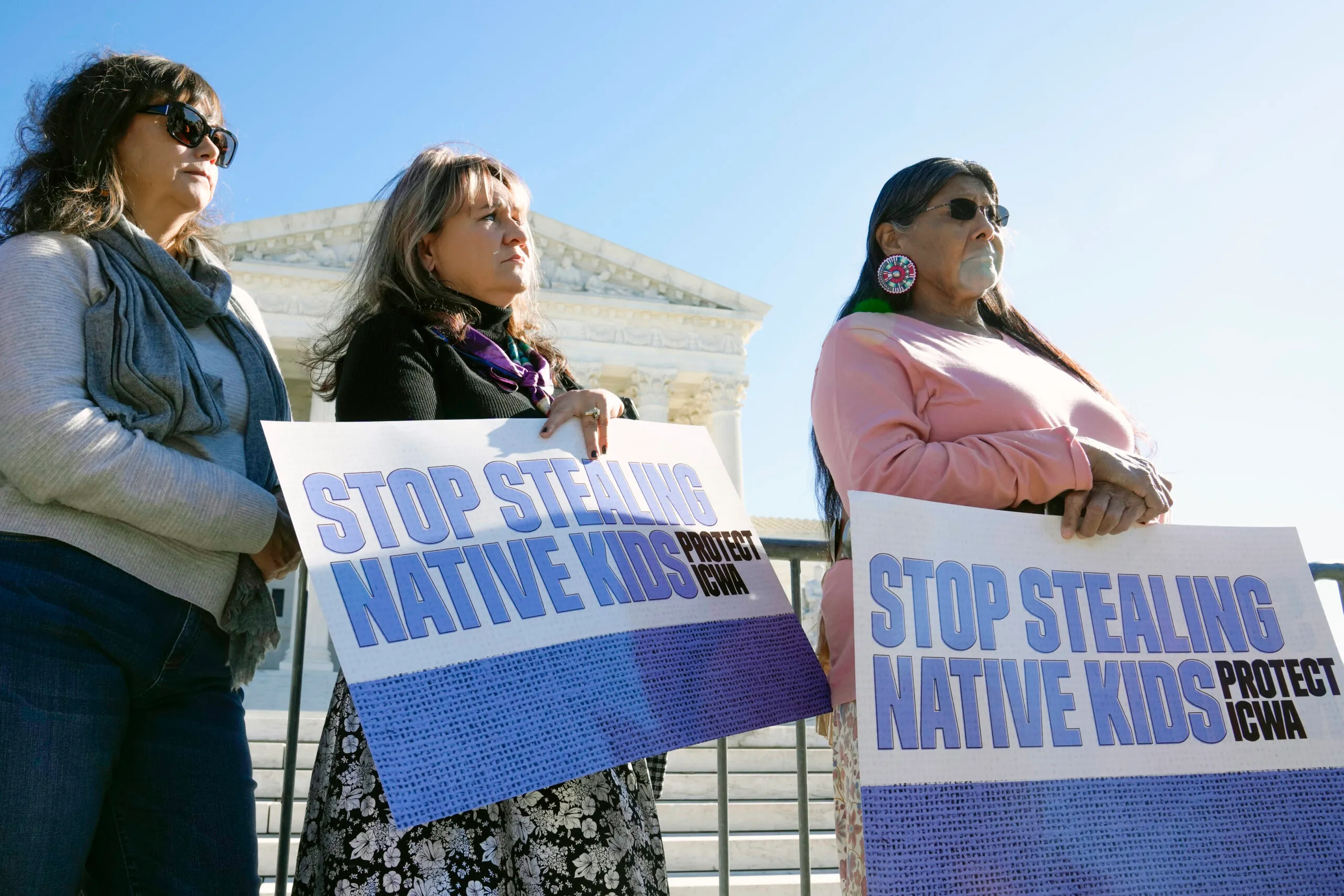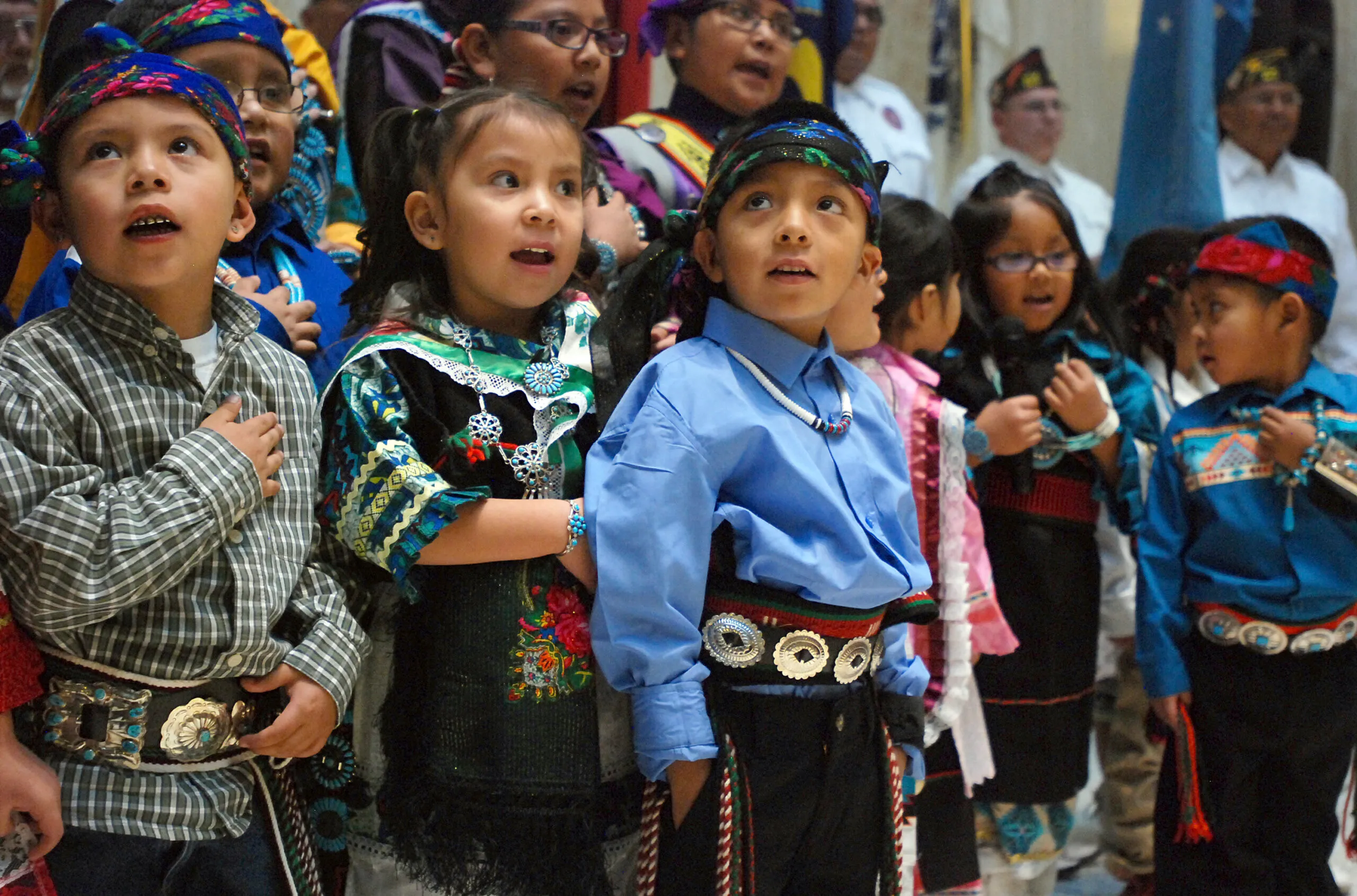The Supreme Court on Thursday upheld all parts of a federal law, meant to remedy past government abuses, which gives preference to the foster care and adoption of Native American children by their relatives and tribes.
Justices considered the scope of the 1978 Indian Child Welfare Act in a case known as Haaland v. Brackeen. The law was passed to fix what Congress said was a disgraceful history in which Native American children were removed by the hundreds of thousands from their homes via adoption agencies and placed with white families or in group homes.
GAS PRICES TODAY: WHERE TO FIND THE CHEAPEST FUEL ACROSS THE COUNTRY

The 7-2 opinion, written by Justice Amy Coney Barrett, left the statute entirely intact. Justices Clarence Thomas and Samuel Alito dissented.
“Before us, a birth mother, foster and adoptive parents, and the State of Texas challenge the Act on multiple constitutional grounds. They argue that it exceeds federal authority, infringes state sovereignty, and discriminates on the basis of race,” Barrett wrote.
“The issues are complicated,” Barrett wrote, adding that “the bottom line is that we reject all of petitioners’ challenges to the statute, some on the merits and others for lack of standing.”
The ICWA was challenged by several people and three states, including Texas. Plaintiffs argued the law requires state officials to put aside the typical standard of doing what is best for a child and rely on racial discrimination in a manner that was unconstitutional.
Meanwhile, tribes and their supporters argued the law is based on political distinctions and that Congress had decided the law was necessary in part to ensure the tribes had a future.
The majority ruling said the challengers lacked the legal standing to contest whether the preference violated the equal protection clause of the 14th Amendment by discriminating on the basis of race.

The lead plaintiffs in the case, Chad and Jennifer Brackeen of Fort Worth, Texas, adopted a Native American child after a lengthy legal fight with the Navajo Nation. The Brackeens want to adopt the boy’s half-sister, who is now 5 years old and has lived with the family since she was born. The Navajo Nation opposed that adoption.
Matthew D. McGill, an attorney for the Brackeens, told the Washington Examiner his clients’ “main concern” on Thursday is what the decision means for the young girl, known in court records as “Y.R.J.”
McGill noted that the justices did not answer the core claim that the “ICWA impermissibly discriminates against Native American children and families that wish to adopt them, saying it must be brought in state court.”
“As Justice Kavanaugh observed today, that equal protection claim is ‘serious,’ and we will ask the state court to address it in the Brackeens’ upcoming trial to adopt Y.R.J.,” McGill added.
All of the children involved in the current case at one point are enrolled or could have been enrolled as Navajo, Cherokee, White Earth Band of Ojibwe, and Ysleta del Sur Pueblo. Some of the adoptions have already been finalized, while some are still being challenged.
The law was defended by the Biden administration and the five tribes.
In response to the Thursday decision, President Joe Biden released a statement calling the ICWA a “vital law” he was proud to support.
“The Indian Child Welfare Act safeguards that which is most precious to us all — our children. Today’s decision from the Supreme Court keeps in place a vital protection for tribal sovereignty and Native children,” Biden said.
Congress enacted the law in response to a large number of Native American and Alaska Native children being taken from their homes by public and private agencies.
“Aggravating matters, these separations were frequently ‘carried out without due process of law.’ … Children and their parents rarely had counsel … For that matter, few cases saw the inside of a courtroom,” Justice Neil Gorsuch, who is considered the most sympathetic justice to Native American issues, wrote in a concurring opinion.
But two of the high court’s most staunch conservatives, Alito and Thomas, vehemently disagreed with the majority’s decision and Biden’s assertion that the law protects children. In fact, Alito said the “sad consequence” of the ICWA is that it may “delay or prevent a child’s adoption by a family ready to provide her a permanent home.”
“I am sympathetic to the challenges that tribes face in maintaining membership and preserving their cultures. And I do not question the idea that the best interests of children may in some circumstances take into account a desire to enable children to maintain a connection with the culture of their ancestors. The Constitution provides Congress with many means for promoting such interests. But the Constitution does not permit Congress to displace long-exercised state authority over child custody proceedings to advance those interests at the expense of vulnerable children and their families,” Alito wrote.
And Thomas wrote that the majority got the decision “backwards” and that the ICWA “lacks any foothold in the Constitution’s original meaning.”
“No law from that time even came close to asserting a general police power over citizens who happened to be Indians — by, for example, regulating the acts of Indians who were also citizens and who lived within the sole jurisdiction of States (and not on Indian lands). If nothing else, the dearth of Founding-era laws even remotely similar to ICWA should give us pause,” Thomas added.
Kirk McGill, special counsel at the Oklahoma-based law firm Hall Estill, told the Washington Examiner the ICWA extends to Native American children who are removed from their families “even if they don’t live on tribal land.”
“One of the primary criticisms of the ICWA is that it applies regardless of how much Indian blood a child has. Proponents however counter that due to dilution by Europeans, it is necessary to protect all Indian children regardless of their blood quantum,” McGill said.
Cato Institute senior fellow Walter Olson told the Washington Examiner that future cases before the court could answer outstanding questions such as “whether children and parents who have never lived in tribal relations or in Indian country may nonetheless be subjected to tribal sovereignty and special custody presumptions because of blood descent alone.”
CLICK HERE TO READ MORE FROM THE WASHINGTON EXAMINER
Meanwhile, the high court on Thursday also pared back tribal sovereignty by holding that the U.S. bankruptcy code “unequivocally” strips Native American tribes of their sovereign immunity despite the statute never mentioning tribes. That opinion was 8-1 and authored by Justice Ketanji Brown Jackson, with Gorsuch dissenting from the pack.
What these two decisions mean together, Kirk McGill explained, is that “Congress has what the Constitution says it has, which is the authority to regulate Indian tribes. The court’s job is to determine how Congress has exercised that power.”

